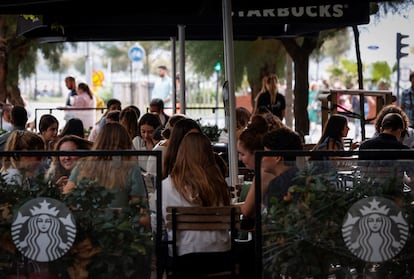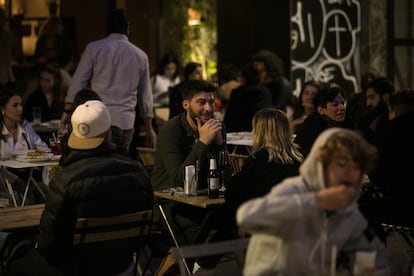Spain’s coronavirus incidence jumps another 20 points as pressure on hospitals rises
The Basque High Court has ruled against the request to introduce the Covid passport, while the Public Health Commission is debating a new traffic light system for determining risk

The incidence rate of the coronavirus in Spain rose again on Monday, with hospitals also reporting a significant increase in admissions for Covid-19. According to the latest Health Ministry report, the 14-day cumulative number of cases per 100,000 inhabitants now stands at 132, up 20 points from Friday, which is the last day for which data is available given no figures are published on the weekend.
The Spanish region of Navarre continues to have the highest incidence rate, with the figure coming in at 373.5 cases per 100,000 – 62 points higher than on Friday. It is followed by the Basque Country (286 cases), Aragón (208), Catalonia (183), the Balearic Islands (181), La Rioja (160) and Castilla y León (130).
In Murcia, Valencia and the Canary Islands, the incidence rate now exceeds 130 cases per 100,000, while in Cantabria, it has reached 100. In the rest of Spain’s regions, which are responsible for their healthcare systems, Covid-19 vaccination drives and coronavirus restrictions, the data point is below 100 but above 50, which is currently the threshold for a low-risk situation.
Pressure on hospitals has also risen significantly. According to the latest figures, there are now 2,880 Covid-19 patients in hospital, an increase of 482 since Friday. In intensive care units (ICUs), there were 64 more admissions for Covid-19 over the weekend, bringing the total to 522. The occupancy rate is 2.33% and 5.7% for hospital wards and ICU beds, respectively. Under the Health Ministry’s planned new traffic light system, a situation is under control if these data points are below 2% and 5%.
The Health Ministry also reported 15,875 new cases since Friday and added 22 deaths to the official toll. In total, 5,096,538 coronavirus infections have been detected since the beginning of the pandemic, while the official death toll stands at 87,832.
With coronavirus cases rising, Navarre has announced plans to make the European Union’s Digital COVID Certificate mandatory in restaurants, nightclubs and large events where food and drink are served indoors. This certificate can be accessed in Spain via each region’s healthcare system, and certifies whether the bearer has been vaccinated against Covid-19, has recently recovered from an infection, or has been tested for the virus. The Navarre government will request authorization to introduce the measure on Wednesday, and if approved, the so-called Covid passport will come into force from November 27 to January 6, both days inclusive.
Meanwhile in Galicia, the government is planning to request court approval to extend the use of the Covid passport to the hospitality sector. Under the plan, which was reached following an agreement with the sector, patrons will need to present the certificate at restaurants, during all opening hours, and at bars and cafes from 9pm. The Covid passport is already required at nighttime venues, and last week, the regional government received court backing to request the certificate from hospital visitors. In addition to this measure, the Galician government has also reduced the number of patrons allowed at a table from 10 to eight in indoor areas, and from 20 to 15 in outdoor spaces, reports Sonia Vizoso.

Since the central government earlier this year lifted the coronavirus state of alarm – one of the three emergency situations the administration can implement – Spain’s regions have had to seek approval from judges for any measure that impinges on fundamental rights, such as the Covid passport. The lower courts, however, often reach different verdicts.
On Monday, for example, the Basque High Court rejected the regional government’s request to introduce the Covid passport in restaurants with capacity for more than 50 patrons and nightlife venues such as nightclubs and karaoke bars. Although the request was backed by the public prosecutor, the court ruled that it was “unjustified.” The judges said the measure unfairly allowed under-12s – who are not required to present a certificate as no Covid-19 vaccine has been approved for this age group – to enter establishments, while restricting the rights of the over-12s, 90% of whom are vaccinated in Spain.
“This access [of the under-12s] favors contagions. However, their access is not hindered, but those over this age are hindered if they don’t show the passport,” stated the ruling, which added that the Basque government “recognizes that they are the main factor of contagions.” The Basque government can appeal the ruling to the Supreme Court, but has confirmed it will not do so.
New traffic light system
Spain’s Public Health Commission, which is made up of health officials from the regional and central government, is expected to soon approve a new traffic light system. The draft of the new design, which was advanced by EL PAÍS last week, lifts some of the thresholds to better reflect the fact that nearly 80% of the population in Spain is fully vaccinated, meaning the risk of the pandemic is lower.
This system has never been mandatory, but is instead meant to provide guidelines on the right steps to curb coronavirus transmission. One of the new guidelines recommends that bars and restaurants close their indoor areas from 11pm, and nightclubs their indoor spaces at 1am, if these establishments are located in a medium-risk territory. This refers to areas where the 14-day incidence rate is between 100 and 300 cases per 100,000 inhabitants, the incidence rate among the over-65s is between 50 and 150, and between 10% and 15% of ICU beds are occupied by Covid-19 patients. Currently, Aragón and Catalonia are above these thresholds.
Experts, however, have expressed doubts about the new system. “Measures must be taken now, such as limiting opening hours and capacity [at hospitality establishments], because the epidemiological curve is rising,” said Albero Infante, professor of the National Health School at the Carlos III Health Institute. “If nothing is done, we will have many more hospital and ICU admissions. We will not reach the extremes of the other waves, but they will rise.”
Tu suscripción se está usando en otro dispositivo
¿Quieres añadir otro usuario a tu suscripción?
Si continúas leyendo en este dispositivo, no se podrá leer en el otro.
FlechaTu suscripción se está usando en otro dispositivo y solo puedes acceder a EL PAÍS desde un dispositivo a la vez.
Si quieres compartir tu cuenta, cambia tu suscripción a la modalidad Premium, así podrás añadir otro usuario. Cada uno accederá con su propia cuenta de email, lo que os permitirá personalizar vuestra experiencia en EL PAÍS.
¿Tienes una suscripción de empresa? Accede aquí para contratar más cuentas.
En el caso de no saber quién está usando tu cuenta, te recomendamos cambiar tu contraseña aquí.
Si decides continuar compartiendo tu cuenta, este mensaje se mostrará en tu dispositivo y en el de la otra persona que está usando tu cuenta de forma indefinida, afectando a tu experiencia de lectura. Puedes consultar aquí los términos y condiciones de la suscripción digital.








































